#Tsu Shi Ma Mi Re
Text
youtube
TsuShiMiMaRe - tea time ska
#tsu shi ma mi re#tsushimamire#tea time ska#benten lable#i can't believe this is 20 years old#Youtube
0 notes
Note
i love love love your blog!! you have a few posts about japanese names, like how to make them and where they fit in but,,, i was wondering how an american name would fit in (like class number, alphabetically, etc.) or how to translate one, if at all. and do you think its a good idea to have an american oc actually attending UA at all? i know you've said you're not an authority, so its totally fine if you dont know. thank youuuu! your templates are amazing btw
Hi, sorry for the late reply! (I actually haven't been on tumblr in like... months. Life and all.)
Foreign/non-Japanese OCs attending UA wouldn't be weird at all--there are canonically at least 3 foreign exchange/transfer/descent/immigrant students (or something of the sort)! Aoyama from 1-A and Pony and Rin from 1-B are all foreigners in some capacity.
As for how they'd fit alphabetically--well, it'd be just like any alphabetical order you'd think of, it's just that it'd be based on the Japanese alphabet instead of English. Here is a good reference for the general rules of that order, including voiced consonants:

In Romaji, these kana are phonetically ordered as:
a, i, u, e, o, ka, ga, ki, gi, ku, gu, ke, ge, ko, go, sa, za, shi, ji, su, zu, se, ze, so, zo, ta, da, chi, di/ji, tsu, du/dzu, te, de, to, do, na, ni, nu, ne, no, ha, ba, pa, hi, bi, pi, fu/hu, bu, pu, he, be, pe, ho, bo, po, ma, mi, mu, me, mo, ya, yu, yo, ra, ri, ru, re, ro, wa, wo, n
(This is ignoring "little" variants since those are never going to be at the start of a word, but it does determine the order of words that do have them in the middle somewhere.)
It may look weird to people used to the English alphabet (you may think it's strange that "pa" comes before "bi" right?) but do keep in mind that Japanese is... well. Not English. This is normal to them!
For a name that doesn't easily fit the Japanese phonetic structure, you'd have to sound it out with kana (and write it out with katakana, since it's a foreign name). Some examples:
Pony, written as ポニー, is read "po-ni-i" (since long vowel sounds are translated in katakana as a long dash), and since it's a name starting with a voiced consonant (po), it would go after names starting with "he" (and its voiced versions) and before names starting with "ma". (If we were sorting characters by first name anyway.)
Peter Parker, written as ピーター・パーカー, is read "pi-i-ta-a / pa-a-ka-a" (again with long dashes translating as long vowels), and would alphabetically go before Pony (in either case of first or last name, since "pi" and "pa" both come before "po"). Also, in case you didn't catch the pattern, the "er" ending in English is most often translated as a long "a" sound!
Richard Grayson, written as リチャード・グレイソン, is read "ri-cha-a-do / gu-re-i-so-n". This is an example of sounds like "gr" that don't translate well in Japanese, so you kind of have to squish two syllables together to get it, with the vowel in the middle being somewhat "silent". The most common "silent" character in Japanese is "u", but I've seen "o" a few times too (see next example).
Mytho or Mute, written as みゅうと or ミュート, is read as "myu-u-to", and can be translated as either of the aforementioned "English" names (because translations aren't a 1-to-1 thing after all). In the example of the "Mute" translation, the silent "o" just kind of sounds better at the end than a "u" does in cases like this.
Thanatos, written as タナトス, is read "ta-na-to-su", and is an example of a name with that silent "u" at the end.
Anthony Stark, written as アントニー・スターク, is read as "a-n-so-ni-i / su-ta-a-ku", and is another example of translating sounds that don't exist in Japanese ("th" in English becomes "s" or "z" in Japanese, and "st[x]" becomes "sut[x]") and the silent "u".
Jason Stryker, written as ジェイソン・ストライカー, is read as "je-i-so-n / su-to-ra-i-ka-a", and is another example of translating sounds that don't exist in Japanese, with "Stryker" showcasing that it uses the "st[x] -> sut[x]" rule AS WELL AS a silent "o" rather than the usual silent "u".
Class number is just based on where they are in the alphabetical order (ie. Aoyama is No.1 because he has the earliest alphabetical character in his surname, "a". Ashido is No.2 because, while she also has an "a" surname, "shi" comes after "o" in the Japanese alphabet).
So for instance, if Richard Grayson was added to 1-A, he would have a seat between Kirishima and Koda since his surname starts with "gu" (in the Japanese writing system!), and his class number would be No.9! Koda and everyone else after him would have their number pushed accordingly. If Peter Parker were added to this same class, he would be between Bakugou and Midoriya!
I hope this helped, and will help others too. Thanks for the ask! (Also thanks for saying so, I feel like no one actually uses the templates at all...)
Anyway, plus ultra and all that!
#my hero academia#boku no hero academia#mha#bnha#japanese#names#getting started#tips#archivist#asks#replies#anonymous
6 notes
·
View notes
Text
Romaji / ローマ字
Romaji is used to write the Japanese pronunciation using alphabets. It used to be used by Japanese speakers in order to write their name or something only in Japanese with alphabets, but currently by non-Japanese speakers to learn Japanese.
As you may already know, Romaji is not formally unified and there are some styles and it's confusing for me, too.
So herewith I would like to write in so-called "Hepburn style" which I think the most popular.
ローマ字 ヘボン式(Romaji in Hepburn style)
あ(A) い(I) う(U) え(E) お(O)
か(Ka) き(Ki) く(Ku) け(Ke) こ(Ko)
さ(Sa) し(Shi) す(Su) せ(Se) そ(So)
た(Ta) ち(Chi) つ(Tsu) て(Te) と(To)
な(Na) に(Ni) ぬ(Nu) ね(Ne) の(No)
は(Ha) ひ(Hi) ふ(Fu) へ(He) ほ(Ho)
ま(Ma) み(Mi) む(Mu) め(Me) も(Mo)
や(Ya) ゆ(Yu) よ(Yo)
ら(Ra) り(Ri) る(Ru) れ(Re) ろ(Ro)
わ(Wa) を(O)
ん(N)
濁音(だくおん)(Daku-on)~濁点付(だくてんつ)き(With ゛ Dakuten)
が(Ga) ぎ(Gi) ぐ(Gu) げ(Ge) ご(Go)
ざ(Za) じ(Ji) ず(Zu) ぜ(Ze) ぞ(Zo)
だ(Da) ぢ(Ji) づ(Zu) で(De) ど(Do)
ば(Ba) び(Bi) ぶ(Bu) べ(Be) ぼ(Bo)
半濁音(はんだくおん)(Han-dakuon)~半濁点付(はんだくてんつ)き(With ゜
Han-dakuten)
ぱ(Pa) ぴ(Pi) ぷ(Pu) ぺ(Pe) ぽ(Po)
拗音(ようおん)(You-on)
きゃ(Kya) きゅ(Kyu) きょ(Kyo)
ぎゃ(Gya) ぎゅ(Gyu) ぎょ(Gyo)
しゃ(Sha) しゅ(Shu) しょ(Sho)
じゃ(Ja) じゅ(Ju) じょ(Jo)
ちゃ(Cha) ちゅ(Chu) ちょ(Cho)
ぢゃ(Dya) ぢゅ(Dyu) ぢょ(Dyo)
にゃ(Nya) にゅ(Nyu) にょ(Nyo)
ひゃ(Hya) ひゅ(Hyu) ひょ(Hyo)
びゃ(Bya) びゅ(Byu) びょ(Byo)
ぴゃ(Pya) ぴゅ(Pyu) ぴょ(Pyo)
みゃ(Mya) みゅ(Myu) みょ(Myo)
りゃ(Rya) りゅ(Ryu) りょ(Ryo)
促音(そくおん)(Soku-on)= っ 小さい「つ」(Small“tsu”)
There is no romaji for single small “っ”,
because we add one more next character,
like”きって=Kitte
長音符(ちょうおんぷ)、横(よこ)棒(ぼう)、伸(の)ばし棒(ぼう)= 「ー」
あー(Ā) いー(Ī) うー(Ū) えー(Ē) おー(Ō)
かー(Kā)きー(Kī)…put a bar over the vowel
ハイフン(-)で繋ぐ…長い単語を分けて表記したい時
Phrases connected with “-“ mean literally they’re connected. Long words are written in multiple parts in Romaji, just for your easy reading.
Ex. Japanese 「では、お客様でございますね。」
Romaji “Dewa, okyaku-sama de gozai-masu-ne.”
English “Then you’re a visitor.”
In this case, “okyakusama” means “visitor”, and it can be separated into three: “o-kyaku-sama” at most. We don’t separate in another parts, because it consists of “o”, “kyaku”, and “sama”. Each part has each meaning.
注意!Uの発音が語尾に来る時の表記はこのブログでは基本的に省略しています。(ただし、言う、思う、誘う、吸うなどの動詞は省略すると分かりにくいので表記)
Writing "-u" words in Romaji is the biggest difficulty for me because there is no best answer. Japanese pronunciation of "-u" is a little weak, and if you pronounce real "u", it hears unnatural.
Pronunciation of English word "so" is exactly the same as Japanese word 「そう」and if I write the pronunciation in alphabets, "so" is better than "sou", I think.
そうそうのフリーレン=So-so-no Furīren (Not Sou-sou-no ...)
ありがとう=Arigato. (Not Arigatou.)
But actually we have many similar words with u and without u, and in this way we can't tell whether the original word include u or not.
I mean, for example, both "葬式(そうしき:funeral)" and "組織(そしき:organization)" are written as "soshiki" in Romaji and it's very confusing.
However, as for this blog, I think it better to write in same way as it hears, so I didn't write weak "-u" pronunciation in Romaji.
3 notes
·
View notes
Text
a i u e o
ka ki ku ke ko
sa shi su se so
ta chi tsu te to
na ni nu ne no
ha hi hu he ho
ma mi mu me mo
ya yu yo
ra ri ru re ro
wa wo
n
ato ten to maru desu
10 notes
·
View notes
Text
ciao a tutti.
volevo iniziare con delle lezioni di giapponese.
voglio subito iniziare col dire che non sono un esperto, ma sto imparando anche io e trovo che questo sia utile per aiutare sia me che gli altri a capire un po' di più la lingua.
spero possa piacervi l'idea!
metodi di scrittura - HIRAGANA:
si usa per:
•indicare particelle che formano frasi
in giapponese
•completare i kanji
•scrivere alcune parole
•scrivere la pronuncia sopra o
a fianco dei kanji
direi di iniziare a vederli insieme
dividiamoli per vocali:
a, i, u, e, o
a:
あa かka さsa たta なna はha まma やya らra わwa
i:
いi きki しshi ちchi にni ひhi みmi りri
u:
うu くku すsu つtsu ぬnu ふfu むmu ゆyu るru
e:
えe けke せse てte ねne へhe めme れre
o:
おo こko そso とto のno ほho もmo よyo ろro をwo
extra: ん n
alcune sillabe cambiano leggermente la pronuncia se si aggiungono due virgolette o un pallino. è più facile se ve le faccio vedere
a:
がga ざza だda ばba ぱpa
i:
ぎgi じji ぢji びbi ぴpi
u:
ぐgu ずzu づzu ぶbu ぷpu
e:
げge ぜze でde べbe ぺpe
o:
ごgo ぞzo どdo ぼbo ぽpo
ad alcune sillabe è possibile aggiungere le sillabe ya, yu, yo, scritte in formato più piccolo, per formare sillabe composte
ya:
やya きゃkya しゃsha ちゃcha にゃnya ひゃhya みゃmya りゃrya ぎゃgya じゃja びゃbya ぴゃpya
yu:
ゆyu きゅkyu しゅshu ちゅchu にゅnyu ひゅhyu みゅmyu りゅryu ぎゅgyu じゅju びゅbyu ぴゅpyu
yo:
よyo きょkyo しょsho ちょcho にょnyo ひょhyo みょmyo りょryo ぎょgyo じょjo びょbyo ぴょpyo
5 notes
·
View notes
Text
Hiragana Log #2
2023/8/25
Know:
あえいおう - A, E, I, O, U
かけきこく - Ka, Ke, Ki, Ko, Ku
させしそす - Sa, Se, Shi, So, Su
たてちとつ - Ta, Te, Chi, To, Tsu
の - No
ひふへ - Hi, Fu, He
もむ - Mo, Mu
ゆ - Yu
ん - N/M
Know But Need Practice:
なねにのぬ - Na, Ne, Ni, Nu
はほ - Ha, Ho
ま - Ma
やよ - Ya, Yo
らり - Ra, Ri
がげぎごぐ - Ga, Ge, Gi, Go, Gu
Need Practice:
みめ - Mi, Me
るれろ - Ru, Re, Ro
ざぜじぞず - Za, Ze, Ji, Zo, Zu
Don't Know:
わ - Wa
だでぢどづ - Da, De, Ji (Di), Do, Zu (Du)
ばべびぼぶ - Ba, Be, Bi, Bo, Bu
ぱぺぴぽぷ - Pa, Pe, Pi, Po, Pu
Any Yōon
#japanese#language study#languages#Moth's language logs#Moth's Japanese logs#hiragana#hiragana study#hiragana practice#langblog#langblr#japanese langblr
1 note
·
View note
Text
I started learning katakana, which is used for foreign words, names, and onomatopoeia. Just like hiragana, katakana has 46 characters. Here’s the complete list with their pronunciations:
Character Pronunciation
ア a
イ i
ウ u
エ e
オ o
カ ka
キ ki
ク ku
ケ ke
コ ko
サ sa
シ shi
ス su
セ se
ソ so
タ ta
チ chi
ツ tsu
テ te
ト to
ナ na
ニ ni
ヌ nu
ネ ne
ノ no
ハ ha
ヒ hi
フ fu
ヘ he
ホ ho
マ ma
ミ mi
ム mu
メ me
モ mo
ヤ ya
ユ yu
ヨ yo
ラ ra
リ ri
ル ru
レ re
ロ ro
ワ wa
ヲ wo
ン n
I’ve been practicing these characters using flashcards and writing them out.
I’m getting the hang of it and it’s pretty fun seeing how different words are written in katakana. More updates coming soon as I dive into kanji for my final project!
0 notes
Text
a an chi chin e en fu fun ha han he hen hi hin ho hon i in ma man me men mi min mo mon mu mun na nan ne nen ni nin no non nu nun o on ra ran re ren ri rin ro ron ru run sa san se sen shi shin so son su sun ta tan te ten to ton tsu tsun u un wa wan we wen wi win wo won ya yan yo yon yu yun
0 notes
Photo

The debate surrounding gender disparity in music continues to rage on, especially in rock. But where female rock truly reigns supreme is in Japan.
Gaining prominence in the 1970s and 1980s with the likes of Shonen Knife, The 5, 6, 7, 8’s, MESCALINE DRIVE, GO-BANGS, Zelda and Princess Princess, the female J-Rock scene is one that continues to thrive, delivering a fun, infectious mix of unabashed kawaii, deft musicality and tomboy cool. It truly is about girl power, but not in that corny, heavily commodified sense.
What I especially love is that there’s no pressure to prove oneself; these girls just get on with it and let the tunes speak for themselves. Even J-Rock News declared the 2010s the ‘Decade of J-Rock Girl Bands.’
In no particular order, here are my Top 5 Female J-Rock picks:
1. Tricot:

When it came to discovering this band, I literally judged an album by its cover.
Back in 2013, I stumbled upon the Kyoto trio’s debut album T H E, where I was introduced to the wonders of math rock, employing a nervous energy combined with poppy hooks and unpredictable yet melodious rhythms.
Since 2010, the band have built a small but committed fanbase, earning praise from the likes of NME, Noisey, NPR and The FADER, and even supported The Pixies during their 2015 UK tour.
Tricot have gone on to release several other albums and EPs, including 2015’s A N D, the breezy, funk-inflected 3, 2016’s Kabuku, last year’s Repeat and Makkuro, released back in January.
Choice Tracks: ‘After School,’ ‘Break,’ ‘E,’ ‘Setsuyakuka,’ ‘On The Boom,’ ‘Munasawagi,’ ‘Pork Ginger,’ ‘Tokyo Vampire Hotel.’
2. Tsu Shi Ma Mi Re (TSMMR):

Haling from Chiba, this trio are delightfully batshit, to say the least.
You like your ska to feel like you’re about to harvest a few souls for the Reaper? Give ‘Tea Time Ska’ a spin. Want a self-love anthem that celebrates being ‘fat and food-loving’? How about ‘American Hamburger? A gut-wrenching tale about a daughter longing for her fisherman father lost at sea? Try ‘Na-mellow (Nameru).’
Active since 1999, Tsu Shi Ma Mi Re, (an amalgamation of all three band members’ names) embrace the strange with their frenzied brand of art punk, inspired by the likes of Rage Against The Machine and even classical music while also addressing themes of food, sex and death in rather funny and disturbing ways.
As well as in Japan, the trio have also enjoyed moderate success in the US, performing at SXSW in 2004 and even opening for the Suicide Girls Live Burlesque Tour a year later.
TSMMR’s most recent album NEW was released in 2017, featuring the single ‘The Payday.’ That same year, drummer Mizue Masuda left the band and was replaced by Maiko Takagi.
Choice Tracks: ‘Tea Time Ska,’ ‘Jaguar,’ ‘Human Coating,’ ‘Sex On The Beach,’ Speedy Wonder.’
3. Stereopony:

Occupying that sweet spot between power pop and early-era Paramore, Stereopony’s time was sadly short-lived after releasing just 11 singles and three albums, the Okinawa trio deciding to go their separate ways in 2011 after vocalist Aimi Haragumi underwent throat surgery to remove polyps.
But at least we still have the memories. Though polished, Stereopony’s sound is breezy and melodious, even leaning towards J-pop at times. But they fuel it with just enough tasty riffs to keep you coming back for more! You might’ve even heard them on your favourite anime, contributing their songs to the likes of Tegami Bachi, Bleach, Mobile Suit Gundam 00 and Eureka Seven AO.
Choice Tracks: ‘Stand By Me,’ ‘Hitohira No Hanabira,’ ‘I Am A Hero,’ ‘Okami,’ ‘Namida No Mukou.’
4. Chatmonchy:

Yet another band that’s since split, the Tokushima trio released their mini-album, Chatmonchy Has Come, in 2005. But it wasn’t until ‘Shangri-La’ was featured on the soundtrack to the 2006 anime Hataraki Man that the band finally started to gain a cult following.
A string of other singles followed over the next several years, though none of them ever reached the heights of ‘Shangri-La.’ They did, however, managed to score four Top 10 albums.
By 2011, drummer Kumiko Takahashi left the band, stating: ‘I’m losing my inspiration to move forward in music. That’s fatal to creating new music, and with the difference between my and Ecchan and Akkochan’s passions, I can’t make new songs while lying about my feelings,’ and while Chatmonchy went on to release three more album as a duo, they eventually decided to disband in 2018.
Takahashi is now a poet and writer. Lead singer Eriko Hashimoto has since gone on to record her own material, while bassist Akiko Fukuoka has produced music for Osaka female duo yonige.
Choice Tracks: ‘Daidai,’ ‘Sekai Ga Owaru Yoru Ni’ ‘Caramel Purin,’ ‘Butterfly Fish,’ ‘Oyashirazu,’ ‘Bus Romance.’
5. SCANDAL:

OGs of the female J-Rock scene, SCANDAL have gone on to redefine what it means to be an all-girl band, telling Billboard Japan: ‘We like being called an "all-girl band." People come up to us and say, "You're not an 'all-girl band' anymore, you're a rock band," and we find that so weird. Who says you can't play rock while also enjoying being women? It's one of our themes as a band. I wish more people would accept all-female bands in a more positive way.’
Formed in August 2006, the Osaka quartet have built up a stellar catalogue of work, starting with 2008’s ‘Doll.’ Other notable singles include 2010’s ‘Shunken Sentimental’ (which appeared in Fullmetal Alchemist), ‘Sakura Goodbye,’ ‘HARUKAZE,’ ‘Doll,’ ‘Shoujo S’ and the recent ‘Living In The City.’
SCANDAL have since gone on to form their own record label called ‘her,’ and released their ninth studio album, A kiss from the darkness, earlier this year.
Choice Tracks: ‘Koisuru Universe,’ ‘Fuzzy,’ ‘Mabataki,’ ‘Platform Syndrome,’ ‘Pinheel Surfer.’
Honourable Mentions:
‘Oh Darling!’ – FliP
‘Nancy’ – BURST GIRL
‘BYE BYE’ – SHISHAMO
‘「LOVE TRIP」’ – The Peggies
‘Lucky’ – Lucie,Too
‘Glory’ – BAND-MAID
‘Dancer in the Hanabira’ – negoto
‘Slacker’ - yonige
‘OIRAN’ – NEMOPHILA
‘Yuryorenai’ – MUTANT MONSTER
‘Taking You Out’ – PassCode
‘Leaving’ – NEVE SLIDE DOWN
‘To The Town’ - Dialuck
‘To The Moon’ – Hump Back
‘IF A SURFER’ - Mass of the Fermenting Dregs
‘Hasharu Kids’ – Regal Lily
‘Double Fist’ – Thug Murder
‘Ms Downer’ - BRATS
‘Up To You’ – SILENT SIREN
‘Marionette’ – MARY’S BLOOD
- Bianca B
1 note
·
View note
Text
Hello!!!
We have an important announcement to share with you.
Drums Mizue is going to leave the band on Februay 10.
She choose another way of her life.
We spent a really long time together, it was 17 and half years!
It was a really great days.
So we wanna say thanks to Mizue.
And we wish she has a great future!!!
Don’t worry!
TsuShiMaMiRe continues to rock with Mari & Yayoi!
Mizue has 4 more shows in Japan.
January 14 (sat) Tokyo Kichijoji ,Silver Elephant
January 15 (sun) Osaka Minami-Horie , knave
January 18 (wed) Tokyo Takadanobaba , CLUB PHASE
February 10(Fri) Chiba , LOOK
[Mari & Yayoi & Mizue ‘s ONE-MAN] DOOR 19:30 SHOW 20:00
Come to see our shows!
And then Mari & Yayoi will start new “TsuShiMaMiRe” with a support drummer!
Keep your eyes on our website , and our SNS.
Love!!!
Mojor Records
These are messages from members.
***************************************************
<from Mizue>
I quit Tsushimamire.
It is because the distance between the future of the Tsushimamire imagined by Mari and yayoi
and my feelings was made.
So I became difficult to exist as a member of Tsushimamire.
I look forward to the activities of the new Tsushimamire and I will watch over them from other places.
And I will continue music some way.
Thank you for supporting me so far!
I`m sorry that I can not continue with them.
See you again somewhere!
Mizue
***************************************************
<from Mari>
I’m proud of these 17 years of TsuShiMaMiRe.
I cannot believe that she leave TsuShiMaMiRe.
I really believed we’ll be able to keep on rockin’ until 80 years old.
I wish she will enjoy her life from now on.
I have a big dream!
It’ll come true by Mari & Yayoi.
I cannot stop going to our great future.
Thank you for your continuous support!
I hope to see you guys in next tour with big smile!
Mari
***************************************************
<from Yayoi>
We formed in 1999.
We spent a lot of time together.
We had many experience together.
We had shared many happiness , many fun, many anger , and many sadness.
We have helped each other.
So, I'm very sad that Mizue quit Tsushimamire ….
But each other have own life. So I respect her own life!
And I still enjoy that my life is Tsushimamire!!
I will make more songs, do tour all of the world, meet more people, make more people fun!!!
I will keep Tsushimamire with Mari!
***************************************************
4 notes
·
View notes
Note
a i u e o ka ki ku ke ko sa shi su se so ta chi tsu te to na ni nu ne no ha hi fu he ho ma mi mu me mo ya yu yo ra ri ru re ro wa wo n
what is the meaning of this guy0509
12 notes
·
View notes
Text
What did I do with my Friday night, you may ask?
Half-assed a Ferengi katakana font, is what. Yeah, I'm what you'd call...pretty cool.

Deets below:
So it turns out the phonemes for the Ferengi character set (ganked from LCARS47.com) map fairly well onto katakana? With some notable exceptions. A lot of phonemes map 1:1 very nicely, but there are spots where Ferengi sounds mush together (ta/da, for example) where the kana make them distinct タダ (ta and da respectively).
There are also sounds that aren't present in Japanese that are distinct in the Ferengi that necessitated some counterintuitive mapping. All the Ferengi l- sounds map onto the z- dakuon, for instance. Ferengi z-sounds already lump into the s-/z-/sh- group, which left the z- dakuon free.
So, Leeta would be リタ ri ta in actual katakana. But to type her name in Ferengi, you have to spell it ジタ (ji ta) to give you "li ta".
For another example, to spell Garak: ガラク ga ra ku. But k- and g- sounds are grouped in Ferengi, so instead it's spelled ka ra ku.
And that left the g- dakuon free to use for the q- sounds that don't exist in katakana, so Quark, in katakana, would need to be クワルク ku wa ru ku. But in this Ferengi font it's spelled ga ru ku, which looks a lot closer to English Garak, doesn't it? ¯\_(ツ)_/¯
Ferengi doesn't appear to have terminal consonants going by the chart, so sounding out words feels eerily familiar to spelling in katakana. Maybe they clip off the vowel at the end, ~desu~ style.
Still, it's pretty fun to play with as an English cipher or for names and decorative nonsense. Here's a screenshot of my mucking around. From left to right: original word - Ferengi phonemes - what to type while in full-width katakana input mode - final result.
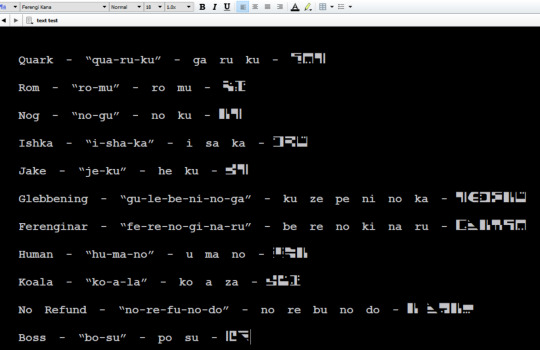
And here's the full mapping of phonemes to kana. You can see where I had to make some allowances. It's possible there's a different writing system that fits better, or a better way to map onto katakana, but this is as well as I can do with my "occasionally fucks around on duolingo" level of expertise, lol.
assigned phonemes: mapped kana:
a/ha a ア
i/hi i イ
u/hu u ウ
e/he e エ
o/ho o オ
ka/ga ka カ
ki/gi ki キ
ku/gu ku ク gu グ
ke/ge ke ケ
ko/go ko コ
sa/za/sha sa サ
si/zi/shi shi シ
su/zu/shu su ス
se/ze/she se セ
so/zo/sho so ソ
ta/da/tha ta タ da ダ
ti/di/thi hi ヒ
te/de/the te テ
tu/du/thu tsu ツ
to/do/tho to ト
na na ナ
ni ni ニ
ne ne ネ
nu nu ヌ
no no ノ n n
ma ma マ
mi mi ミ
me me メ
mu mu ム
mo mo モ
ya ya ヤ
ye yu ユ
yo yo ヨ
ra ra ラ
ri ri リ
re re レ
ru ru ル
ro ro ロ
wa wa ワ
wi do ド
we de デ
wo wo ヲ
pa/ba pa パ
pi/bi pi ピ
pe/be pe ペ
pu/bu pu プ
po/bo po ポ
fa/va ba バ
fi/vi bi ビ
fe/ve be ベ
fu/vu bu ブ
fo/vo bo ボ
cha/ja ha ハ
chi/ji chi チ
che/je he ヘ
chu/ju fu/hu フ
cho/jo ho ホ
la za ザ
li ji ジ
le ze ゼ
lu zu ズ
lo zo ゾ
qua/gwa ga ガ
qui/gwi gi ギ
que/gwe ge ゲ
quo/gwo go ゴ
#star trek#ds9#ferengi#free fonts#feel free to clone the font and make tweaks or different graphics or whatever#i just used the default brick set i didn't draw vector art or anything fancy#yes im avoiding working on other things how did you guess#all 5 people who might want this come get y'all food
108 notes
·
View notes
Text
Hiragana and Katakana / ひらがな、カタカナ
There are 3 types of characters in Japanese - Hiragana, Katakana, and Kanji.
Hiragana(ひらがな) is the easiest to read, and every sentence can be written in it, just like alphabet in English, even if we don't know correct Kanji.
Katakana(カタカナ) is another version of Hiragana, used for the words from foreign countries. For example, we write "ケーキ"(from "cake" in English) or "パン"(from "pão" in Portuguese, which means "bread" in English) as both didn't originally exist in Japan.
Kanji was brought from China, of course, and were developed as Japanese characters. Each Kanji has each meaning, so it makes us easier to understand what it exactly means. For example, when we see "いし", we don't know what it means because we have many words of the same sound ;石(stone), 意思(intention), 医師(doctor), etc.
Japanese sentences are made up of a mixture of these three types of characters.
Hereunder you can see the list of Hiragana and Katakana.
基本ひらがな(Basic Hiragana)
-for keyboard input-
あ(A) い(I) う(U) え(E) お(O)
か(Ka) き(Ki) く(Ku) け(Ke) こ(Ko)
さ(Sa) し(Shi) す(Su) せ(Se) そ(So)
た(Ta) ち(Chi) つ(Tsu) て(Te) と(To)
な(Na) に(Ni) ぬ(Nu) ね(Ne) の(No)
は(Ha) ひ(Hi) ふ(Fu) へ(He) ほ(Ho)
ま(Ma) み(Mi) む(Mu) め(Me) も(Mo)
や(Ya) ゆ(Yu) よ(Yo)
ら(Ra) り(Ri) る(Ru) れ(Re) ろ(Ro)
わ(Wa) を(Wo)
ん(N)
As for pronunciation...
orange colored characters are sometimes different from the original sounds.(は may be pronounced "Wa", へ may be "E", and it depends on how to use the character in the sentence.)
Red colored ones are completely different.(を is always pronounced "o", not "wo".)
濁音(Daku-on)~濁点付き(With ゛ Dakuten)
が(Ga) ぎ(Gi) ぐ(Gu) げ(Ge) ご(Go)
ざ(Za) じ(Ji) ず(Zu) ぜ(Ze) ぞ(Zo)
だ(Da) ぢ(Di) づ(Du) で(De) ど(Do)
ば(Ba) び(Bi) ぶ(Bu) べ(Be) ぼ(Bo)
Pronunciation : ぢ="Dzi" or "Ji"
づ="Dzu" or "Zu"
半濁音(Han-dakuon)~半濁点付き(With ゜Han-
dakuten)
ぱ(Pa) ぴ(Pi) ぷ(Pu) ぺ(Pe) ぽ(Po)
拗音(You-on)
きゃ(Kya) きゅ(Kyu) きょ(Kyo)
ぎゃ(Gya) ぎゅ(Gyu) ぎょ(Gyo)
しゃ(Sha) しゅ(Shu) しょ(Sho)
じゃ(Ja) じゅ(Ju) じょ(Jo)
ちゃ(Cha) ちゅ(Chu) ちょ(Cho)
ぢゃ(Dya) ぢゅ(Dyu) ぢょ(Dyo)
にゃ(Nya) にゅ(Nyu) にょ(Nyo)
ひゃ(Hya) ひゅ(Hyu) ひょ(Hyo)
びゃ(Bya) びゅ(Byu) びょ(Byo)
ぴゃ(Pya) ぴゅ(Pyu) ぴょ(Pyo)
みゃ(Mya) みゅ(Myu) みょ(Myo)
りゃ(Rya) りゅ(Ryu) りょ(Ryo)
Pronunciation : ぢゃ= "Dza" or "Ja"
ぢゅ="Dzu" or "Ju"
ぢょ="Dzo" or "Jo"
促音(Soku-on)= っ 小さい「つ」(Small“tsu”)
There is no romaji for single small “っ”,
because we add one more next character,
like きって=Kitte , or はっぱ=Happa.
基本カタカナ(Basic Katakana)
Pronunciation is completely same as Hiragana and please read above in detail.
ア(A) イ(I) ウ(U) エ(E) オ(O)
カ(Ka) キ(Ki) ク(Ku) ケ(Ke) コ(Ko)
サ(Sa) シ(Shi) ス(Su) セ(Se) ソ(So)
タ(Ta) チ(Chi) ツ(Tsu) テ(Te) ト(To)
ナ(Na) ニ(Ni) ヌ(Nu) ネ(Ne) ノ(No)
ハ(Ha) ヒ(Hi) フ(Fu) ヘ(He) ホ(Ho)
マ(Ma) ミ(Mi) ム(Mu) メ(Me) モ(Mo)
ヤ(Ya) ユ(Yu) ヨ(Yo)
ラ(Ra) リ(Ri) ル(Ru) レ(Re) ロ(Ro)
ワ(Wa) ヲ(Wo)
ン(N)
濁音(Daku-on)~濁点付き(With ゛ Dakuten)
ガ(Ga) ギ(Gi) グ(Gu) ゲ(Ge) ゴ(Go)
ザ(Za) ジ(Ji) ズ(Zu) ゼ(Ze) ゾ(Zo)
ダ(Da) ヂ(Di) ヅ(Du) デ(De) ド(Do)
��(Ba) ビ(Bi) ブ(Bu) ベ(Be) ボ(Bo)
半濁音(Han-dakuon)~半濁点付き(With ゜
Han-dakuten)
パ(Pa) ピ(Pi) プ(Pu) ペ(Pe) ポ(Po)
拗音(You-on)
キャ(Kya) キュ(Kyu) キョ(Kyo)
ギャ(Gya) ギュ(Gyu) ギョ(Gyo)
シャ(Sha) シュ(Shu) ショ(Sho)
ジャ(Ja) ジュ(Ju) ジョ(Jo)
チャ(Cha) チュ(Chu) チョ(Cho)
ヂャ(Dya) ヂュ(Dyu) ヂョ(Dyo)
ニャ(Nya) ニュ(Nyu) ニョ(Nyo)
ヒャ(Hya) ヒュ(Hyu) ヒョ(Hyo)
ビャ(Bya) ビュ(Byu) ビョ(Byo)
ピャ(Pya) ピュ(Pyu) ピョ(Pyo)
ミャ(Mya) ミュ(Myu) ミョ(Myo)
リャ(Rya) リュ(Ryu) リョ(Ryo)
促音(Soku-on)= ッ 小さい「ツ」(Small “tsu”)
0 notes
Text
Kiryu (1988) Character Story
This one was a real struggle, but it’s very fun, so I’m glad I translated it. Here’s our card:
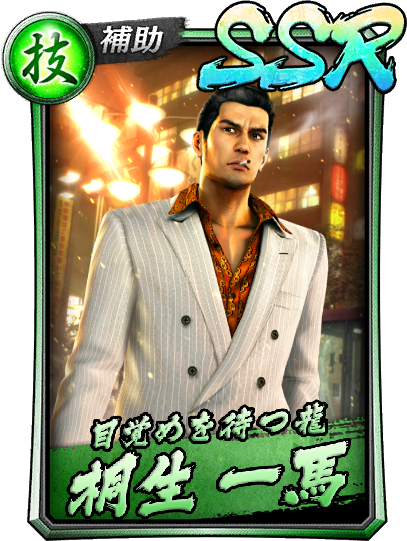
Summary: Set in 1987, Nishiki attempts to teach Kiryu how to use his pocket bell. He’s just horrible at reading it correctly, and a girl keeps hitting on him through it, and it’s just a real mess. He’s not sure why everyone’s so worried when they see the messages, he’s just going to turn her down!
1987 (a year before Y0, Kiryu and Nishiki would be ~19)
It's been 2 years since Kiryu and Nishiki joined the Dojima Family (which, damn I guess they joined around 17)
Nishiki has bought Kiryu a pocket bell (the pager thing) and is explaining how it works and that no it's not a phone and you can only send numbers.
Nishiki explains that if he sends 0906 that means to meet up. Kiryu asks how he's supposed to know that. Nishiki explains that there's a pocket bell code, 0 = o 9 = ku 0 can also = zero or rei and in this case is re and 6 = ru giving okureru which is telling someone to come somewhere.
Kiryu's a little worried that since numbers can have multiple meanings that it might get confusing. Nishiki says he'll get used to reading it. A lady is gathering pager numbers for some kind of campaign and Nishiki immediately writes his down and says Kiryu should do the same before running off very quickly to a bathroom.
Some dude starts hassling the highschooler running the signing campaign, so Kiryu promptly kicks the shit out of him. The dude was another part timer and is now fired by the boss. The girl profusely thanks Kiryu and asks him to wait a minute while she gets something from the shop. Nishiki returns and says “You're thinking ‘I didn't notice until Nishiki said it but... I'm weak to high school uniforms’, aren't you, Kiryu?”
Kiryu just ignores that and says that Nishiki sure took a while. Nishiki says the toliets were crowded but hey that girl you got to talk to was super cute right?? and Kiryu's just like "I don't really think so?" and Nishiki tells him to stop being shy about it, or at least tell him what his type is. Kiryu says he doesn't really have a type, now get back to teaching me how the pocket bell code works.
Nishiki says fiiiiiiiiiiiiine he'll be Nishiki sensei.
0 can be e - o - no - ma - re - wa - wo - n
1 can be a - i - hi
2 can be tsu - ni - me - ne - fu
3 can be sa - su - mi
4 can be shi - ho - yo
5 can be u - ko
6 can be mu - ri - ru - ro
7 can be sa - chi - na
8 can be ha - ya
9 can be ka - ki - ku - ke
1 can also be the english letter i, and therefore ai
10 can be te - to
Nishiki has given him a challenge to deciper: 10646 249
Kiryu’s guess is completely off-base, Nishiki is surprised he can’t even figure out 249 is Ni-shi-ki. Kiryu says this is too hard. Nishiki excuses himself off to the bathroom again and makes it back really fast this time. Kiryu notices he’s gotten a message from an unknown number, it’s 14106. That's aishiteru (I love you, and like a serious kind of I love you) and man oh man is the timing suspicious on this but Kiryu is very taken aback by it.
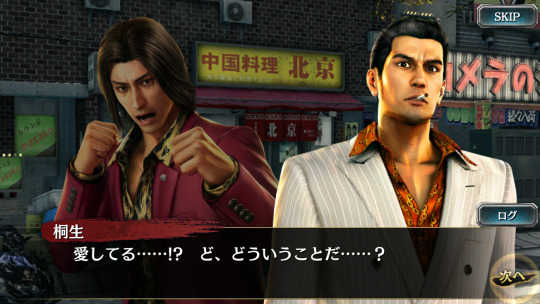
Nishiki says he doesn’t recognize the number it came from, but hey? Didn’t Kiryu just write down his number on that cute girl’s campaign sheet? Maybe it was from her...
Kiryu’s not thrilled with this prospect, but Nishiki tries to get him to ask her out to eat. Kiryu has absolutely no intention of ever asking her out and just goes back to his apartment instead.
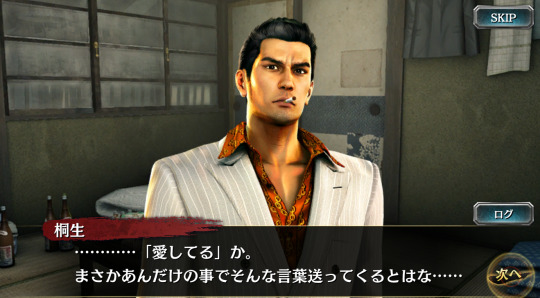
Kiryu has gotten a new message, this one is 4592096. he's alone so he's puzzling it out and wishing Nishiki were here to help. he comes up with shikoku ni maguro which he translates as................ "tuna from Shikoku (one of Japan's islands)"! and then wonders what the hell that means.
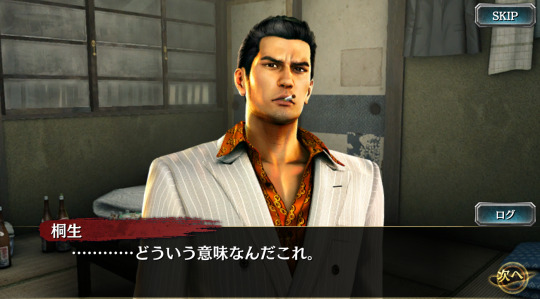
<Part Two>
Kiryu is sitting around in Children’s Park and staring at his pocket bell. One of the younger members of the Dojima Family is a little concerned.
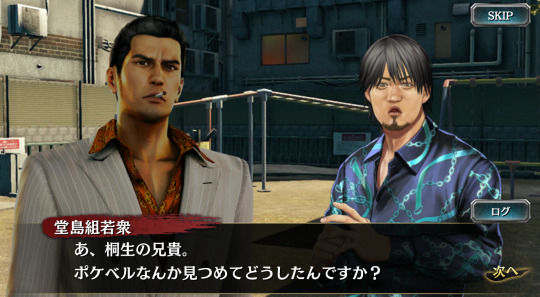
He asks the guy if he knows pocket bell and the guy translates it to jigoku ni okuru "go to hell", which the guy is rightfully very concerned about Kiryu saying a girl sent that to him. Kiryu asks if maybe it's shikoku ni maguro and she's asking to go together to shikoku to eat tuna? the guy says that I guess you could read it that way.........
Kiryu asks if he could teach him how to say some things back. the guy offers up 1-1 which is H (ecchi), and condom is 56 (gomu, condom) and Kiryu thinks these are weird things to be teaching him but okay. Kiryu gets 563 and is immediately like are you SURE 56 is condom? He confirms, and Kiryu thinks damn, is she asking me to bring three condoms?? He runs off, only for the goon to be like wait 563.... that's not 3 condoms!! that's korosu (kill you), but Kiryu is already gone.
He books it back to the lady just in time to stop her from being hassled again. Kiryu: Hey I wanna talk about those messages you sent me
Naomi: Huh? What messages are you talking about?
Kiryu: I think it'd be a bad idea for us to go together to Shikoku... that's what I came here to tell you
Naomi: I...... have no idea what you're talking about
Kiryu: ...................
Kiryu: .......................Uh. I was mistaken. Please forget all of that.
She is now concerned about Kiryu, but also thinks he’s a little cool.
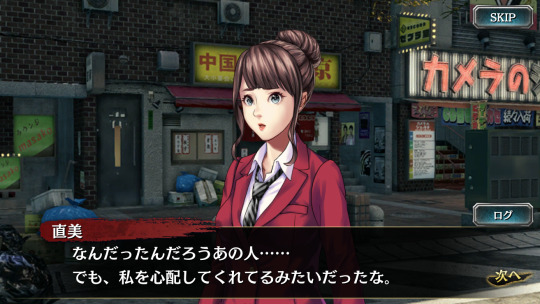
Kiryu goes and tells Nishiki about this and gets another message, this time 564219 (koroshi ni iku, coming to kill you) which Kiryu incorrectly translates as....................... gomu shi ni iku, coming to use condoms. He believes that Naomi is sending it and that she just won't give up! He decides he has to stop her from going to his house. Nishiki is concerned that someone wants to kill Kiryu.
Neither of them tell each other their translation! Both of them assume that the seriousness with which they are responding means they're on the same page!!
<Part 3>
Kiryu: Tch, this is bad. I'm going to have to have a serious talk... Nishiki, I should do this on my own.
Nishiki: (Wh-... they're threatening to kill him and he wants to go alone! I can't let him do something so dangerous!!)
Nishiki: Hey, Kiryu, I'm going with you.
Kiryu: !?
Kiryu: W-Wait!! I'm going to make this stop! I-I'm not doing what you think I'm doing!
Nishiki: ...I see. By the way... why is your face so red...?
Kiryu: ...You're talking nonsense. .....Though, I didn't know you had a preference for threesomes...
Nishiki: Preference for threesomes...? What do you mean...?
Kiryu: .........I'm going. I'll see you after this.
Nishiki: ..........Man, he sure is a strange dude.
Kiryu chases down Naomi, who, at this point, has had Kiryu save her twice and track her down twice, and makes the honestly rational guess that Kiryu might have a crush on her, and asks him if he does. He just says what the hell are you talking about? You're the one who said you're coming here to use condoms!
Kiryu goes on a stumbling speech along the lines of "Hey it's okay, I understand that you're used to men being attracted to you... and that usually they're snared by your looks... however..." and she's like I have no idea what you're talking about, why are you talking about condoms???? It finally gets cleared up that no she absolutely did not send those messages why would you assume this I thought you were cool but you're awful, fuck off and die.
“..................What did she mean by that? Is she too embarrassed to tell me the truth again.....?”
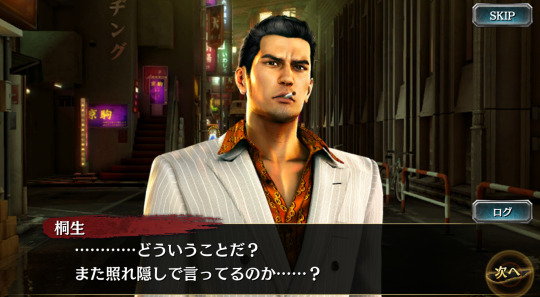
Kiryu then gets jumped by the true culprit of these text........... the guy who kept hassling Naomi!
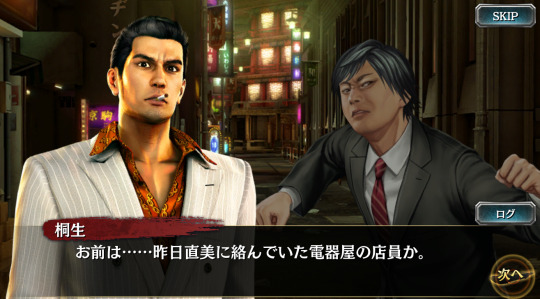
Kiryu beats the hell out of him for a third time, and the guy very slowly, very patiently explains the meanings of all of his texts. Kiryu has a flashback to each of the times he put his foot in his mouth around Naomi, and is mortifyingly embarrassed.
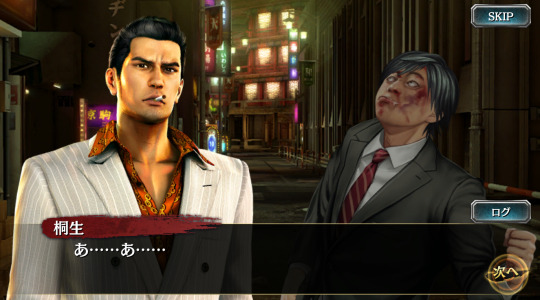
Kiryu asks what the hell 14106 meant then, and the guy says “That’s... I love you, ain’t it? I never sent that.” Kiryu, in an incredible attempt to save his own ego, thinks well hey, maybe Naomi did send that one!
Nishiki barges in as backup, not willing to let Kiryu get himself killed. Kiryu realizes that Nishiki read the message correctly, and Nishiki wants to know what the hell Kiryu thought it meant. Kiryu explains and Nishiki is just completely astounded at how badly Kiryu fucked this up.
Kiryu then starts conspiracy theory-ing that Naomi must have instantly fallen in love with him, because he was her savior, but he has no idea how to let her down gently because he's not interested..................... and then Nishiki finally confesses.
He's the one that sent the 14106 message. Messages take a little bit of time to arrive, so he did it when he "went to the bathroom" and then ran back so Kiryu wouldn't suspect anything. And then he didn't want to spoil it because seeing Kiryu act so flustered was really great.
Kiryu is not happy, but Nishiki bribes him with ramen and all is good.
(I had trouble telling here if Nishiki offers ramen to put Kiryu back into a good mood here, or if he was saying he sent the I love you message to put Kiryu in a good mood so that they could get ramen. Either way, it doesn’t change a whole lot)
<END>
As soon as I started translating this for Fats Clan I posted this.

I think this lands firmly between woke and bespoke. Congrats to anyone who likes Kiryu/Nishiki, you get a canon “I love you”.
This card’s title is along the lines of “the dragon yet to awaken”, fitting with a lot of Kiryu’s cards mentioning him as some sort of dragon.
To be completely honest, I can’t figure out exactly what Nishiki sent either! Kiryu's guess is とろしろにしく and Nishiki is just like come on man it's てるしろにしき which I’m just really unsure on both of them! My best guesses are that Kiryu translated it as something weird like “Go spread out white fatty tuna” ( とろ = fatty tuna しろ = white に = direction particle しく = spread out. Does he keep thinking about tuna??) and Nishiki’s as “Telephone number Nishiki is using” ( てる = TEL, しろ = imperative of する, and then にしき is obviously Nishiki) but there’s like 15 different ways to translate them instead.
I sympathize fully with Kiryu.
152 notes
·
View notes
Text
Writing System
This is super important, before we begin with learning words and sentences.
Japanese has 3 writing systems so to speak. Two of them are syllabaries, you may refer to them as "Alphabets", and the third writing system is sort of symbol based, like Chinese.
There's also ROMAJI. Which we'll be using to help you learn sounds and to speak. But please, work on learning the syllabaries as soon as possible. Romaji is terrible for many reasons, including the fact that everyone and their mother writes Romaji in a different way. You may notice that my Romaji is different than some others you've come across. So again. Try to get away from it as soon as possible. Don't be afraid. I know you can do it!
We'll start with Kana, namely Hiragana as you'll be seeing it the most.
HIRAGANA
Hiragana is used mainly for native Japanese words. You will see Hiragana everywhere. So you'll be wanting to learn that first.
A:あ I:い U:う E:え O:お
Ka:か Ki:き Ku:く Ke:け Ko:こ
Sa:さ Shi:し Su:す Se:せ So:そ
Ta:た Chi:ち Tsu:つ Te:て To:と
Na:な Ni:に Nu:ぬ Ne:ね No:の
Ha:は Hi:ひ Fu:ふ He:へ Ho:ほ
Ma:ま Mi:み Mu:む Me:め Mo:も
Ya:や Yu:ゆ Yo:よ *yes there are only 3 of these
Ra:ら Ri:り Ru:る Re:れ Ro:ろ
Wa:わ Wo:を *yes there's only 2 of these
N:ん
Okay, now some of these characters get whats called a "Dakuten" that's a little " or ゜that's next to the Hiragana that changes it's sound. those are as follows:
Ga:が Gi:ぎ Gu:ぐ Ge:げ Go:ご
Za:ざ Ji:じ Zu:ず Ze:ぜ Zo:ぞ
Da:だ Zi:ぢ Dzu:づ De:で Do:ど
Ba:ば Bi:び Bu:ぶ Be:べ Bo:ぼ
Pa:ぱ Pi:ぴ Pu:ぷ Pe:ぺ Po:ぽ
ぱ ぴ ぷ ぺ ぽ are the only ones that use the ゜dakuten.
You'll notice that 「ぢ」sounds like "zi" ... or "dzi"... and not "di" and that 「づ」sounds like "dzu" and not "du" ... that's.... that's a pain in the butt but it is what it is. In order to get the "di" sound it's written 「でぃ」"de" and a little "i" makes "di" ... and actually you'll probably only ever see that written in Katakana 「ディ」
Which brings me to the next part. Little vowels and Little Y sounds.
We covered some of the little y sounds last lesson. You'll see more little Ys than little vowels. The biggest thing you need to remember about little Ys is that they're always stuck to an "-i" character.
Kya:きゃ Kyu:きゅ Kyo:きょ Gya:ぎゃ Gyu:ぎゅ Gyo:ぎょ
Sha:しゃ Shu:しゅ Sho:しょ Ja:じゃ Ju:じゅ Jo:じょ
Cha:ちゃ Chu:ちゅ Cho:ちょ
Nya:にゃ Nyu:にゅ Nyo:にょ
Hya:ひゃ Hyu:ひゅ Hyo:ひょ Bya:びゃ Byu:びゅ Byo:びょ
Pya:ぴゃ Pyu:ぴゅ Pyo:ぴょ
Rya:りゃ Ryu:りゅ Ryo:りょ
You'll notice some of these don't have "y"s in the romaji reading. Don't freak. That's just how it works. And is part of the reason I don't like Romaji.
Like I said you'll also see little vowels: ぁ ぃ ぅ ぇ ぉ but like with 「ディ」"di" you'll probably only ever see them in Katakana. Here's a few anyway:
Fa:ふぁ Fi:ふぃ Fe:ふぇ Fo:ふぉ
She:しぇ Je:じぇ Che:ちぇ Ti:てぃ Di:でぃ
Finally there's little "tsu" っ this little symbol DOUBLES the next consonant!
っか = kka っさ = ssa
etc. a っ can be near any other kana it doesn't really have a restriction besides not coming before あ, い, う, え, お, or ANY of the "N"s
If you come across a double n it will be written with the lone N first 「ん」 followed by one of the Ns with a vowel next to it.
Ex: Konnichiwa = こんにちは
Like English the double consonant doesn't change the sound, it just lengthens it by a fraction (if even that).
っき = "kki" pronounced the same as "ki" って= "tte" pronounced the same as "te"
Does that make sense? :)
KATAKANA (less explanation here because it's the same rules and sounds)
Katakana is used mainly for loan words. Words borrowed from other languages. It's also used in some names.
A:ア I:イ U:ウ E:エ O:オ
Ka:カ Ki:キ Ku:ク Ke:ケ Ko:コ
Sa:サ Shi:シ Su:ス Se:セ So:ソ
Ta:タ Chi:チ Tsu:ツ Te:テ To:ト
Na:ナ Ni:ニ Nu:ヌ Ne:ネ No:ノ
Ha:ハ Hi:ヒ Fu:フ He:ヘ Ho:ホ
Ma:マ Mi:ミ Mu:ム Me:メ Mo:モ
Ya:ヤ Yu:ユ Yo:ヨ
Ra:ラ Ri:リ Ru:ル Re:レ Ro:ロ
Wa:ワ Wo:ヲ
N:ン
Ga:ガ Gi:ギ Gu:グ Ge:ゲ Go:ゴ
Za:ザ Ji:ジ Zu:ズ Ze:ゼ Zo:ゾ
Da:ダ Dzi:ヂ Dzu:ヅ De:デ Do:ド
Ba:バ Bi:ビ Bu:ブ Be:ベ Bo:ボ
Pa:パ Pi:ピ Pu:プ Pe:ペ Po:ポ
Kya:キャ Kyu:キュ Kyo:キョ Gya:ギャ Gyu:ギュ Gyo:ギョ
Sha:シャ Shu:シュ Sho:ショ Ja:ジャ Ju:ジュ Jo:ジョ
Cha:チャ Chu:チュ Cho:チョ
Nya:ニャ Nyu:ニュ Nyo:ニョ
Hya:ヒャ Hyu:ヒュ Hyo:ヒョ Bya:ビャ Byu:ビュ Byo:ビョ
Pya:ピャ Pyu:ピュ Pyo:ピョ
Mya:ミャ Myu:ミュ Myo:ミョ
Rya:リャ Ryu:リュ Ryo:リョ
Ti:ティ Di:ディ She:シェ Je:ジェ Che:チェ
Va:ヴァ Vi:ヴィ Vu:ヴ Ve:ヴェ Vo:ヴォ
ッコ= kko ッソ= sso ッタ=tta ッシ=sshi
... there are probably other possibilities I've left out, but these are all the common ones you should see. and even if that's not true I trust that you can see and understand the pattern here. :)
KANJI There's thousands of Kanji, so I'm not going to list. I will have Kanji in with the lessons, but learn them at your own pace. No worries. :) I've found that once I got to the point where I could start learning Kanji it's made reading a lot easier for me.
Sorry if this is a HELLISH ammount. Just write the syllabaries down and come back to them now and then as reference. You don't have to learn them all today, or this week, or even this month. I just want you to be familiar with them. :)
7 notes
·
View notes